#but I'm still only half way through re-reading Disorder which I absolutely love
Text
I feel overwhelmed by the amount of fics I have to read :(
#Honestly there's some of you writing multiple fics a day#hooowwww??#i can't read that many#and you WRITE that many#???!!!!#move aside avengers#there's new superheroes in town#I don't want to just close the browsers and lose them#I'd feel bad :(#but I'm still only half way through re-reading Disorder which I absolutely love#but feel I'm being slow af#and i wanna know how it ends#!!!!#ffs!!!#plus i gotta add them to the right posts
2 notes
·
View notes
Text
My Lesbian Experience with Loneliness by Nagata Kabi - Book Review and Impressions
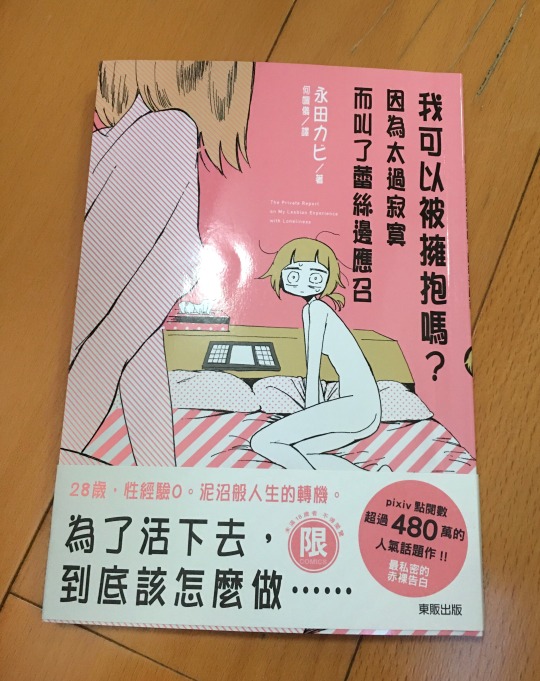
(light reflection) Perfect :D Hoping Tumblr doesn't flag me for this xD
Ok, I'm going to start this off with 'this is probably the first and only book review I'm going to do' xD Because I rarely do read books now, and just as rarely buy them. Also, I would have preferred to buy the English version but alas they only had the Chinese version in stock ^^"
Stumbling upon this on the Internet, I was immediately compelled to buy this, as if I knew I would love it and that Nagata's story would resonate with me.
【Short Version】 I can't recommend this book enough, it doesn't matter what sexuality you are or from what culture are you. Nagata makes sure to tell an honest and 'naked' (without embellishments) portrait of her own personal experiences. How she herself is a college drop-out (having only graduated from high school), pushed herself to live/work while struggling with depression and eating disorders, not being sure of what she wants and feeling that she doesn't 'deserve' things, realizing her own sexuality in that she likes girls, and just not feeling 'good enough'...all through her cutesy and unassuming art style.
I will say again though, cutesy art style aside, the book deals with some very heavy topics. Nagata is very honest and doesn't shy away from the gritty details, and I admire her all the more for doing so. Many yaoi and yuri comics often portray an unrealistic and fetishistic view of the LGBTQ+ community whereas Nagata's story is much more grounded and sincere. This is not an easy read, but it's not an overly depressive one either. Nagata literally struggled for years with her mental health, but ultimately found light on the other side. Not mainly through the help of others, but through her own choice to forgive and love herself.
5/5⭐ Definitely recommend and would read again. And if I could, I'd give Nagata a big hug and a heartfelt 'thank you' for sharing her story.
【Long Version】 While it's written primarily from an Asian (particularly Japanese) perspective, Nagata's experiences are ones that should resonate with anyone who has been through the same or similar things, regardless of one's personal background. And I myself, while being fortunate enough to not have gone through eating disorders or self harm, am no exception.
I grew up in an Asian (Taiwanese/Chinese Filipino) household, while my parents weren't Tiger Parents (no offense but fuck Amy Chua for thinking that's a proper way of raising your children), they still had certain expectations on their children: to find a good husband/wife, have a good education, have a 'stable' career, etc. And while I love my parents very much, I'd be lying if I said there weren't any times where I felt they were smothering me, there weren't any times where they kept on nagging and bugging me for very trivial details. My biggest pet peeve: guilt-tripping me just for wanting to spend time alone.

"For me, my parents' opinion of me is absolute." (NOTE: While I won't be providing exact translations of the excerpts I used here, I'll do my best to summarize the gist of them.)
At the same time, I cared very much about their opinion of me. I made it a point to do well in school, to do things according to their wishes, and just like Nagata, I didn't know what I wanted. This even extended to caring about others' opinion of me, more than my own. In my freshman year of college, I 'went along' with being friends with someone, who while was nice to me, turned out to be a manipulative bitch skilled in passive-aggressiveness xD Being half-Taiwanese/half-Filipino, it was hard to fit in since people always treated me differently, it didn't occur to me I could be choosy with friends, I thought as long as they were 'nice' to me, that would do.
Asian culture is largely a collective one, where we define ourselves by our relationships with others, compared with Western culture (primarily America, I'll be using America as a reference point) where individualism is absolute, where you define yourself as you like. In Asia, it's also normal for children to still live in the same house as their parents well into adulthood, compared with Americans who are expected to move out the house once they finish high school or start college, and they're quite literally 'on their own', having to pay their own tuition, rent, etc. Where I live (Taiwan), it's normal for adults to continue relying on their parents financially well until college. Nagata for instance, while saying her parents really make her feel so pressured, is grateful that she still had a home to stay in (and she's 28!).
If you ask me though, neither a collectivist culture or an individualist culture is absolutely good nor bad. Each have their own pros and cons, and both Asian culture and Western culture could learn a thing or two from each other.
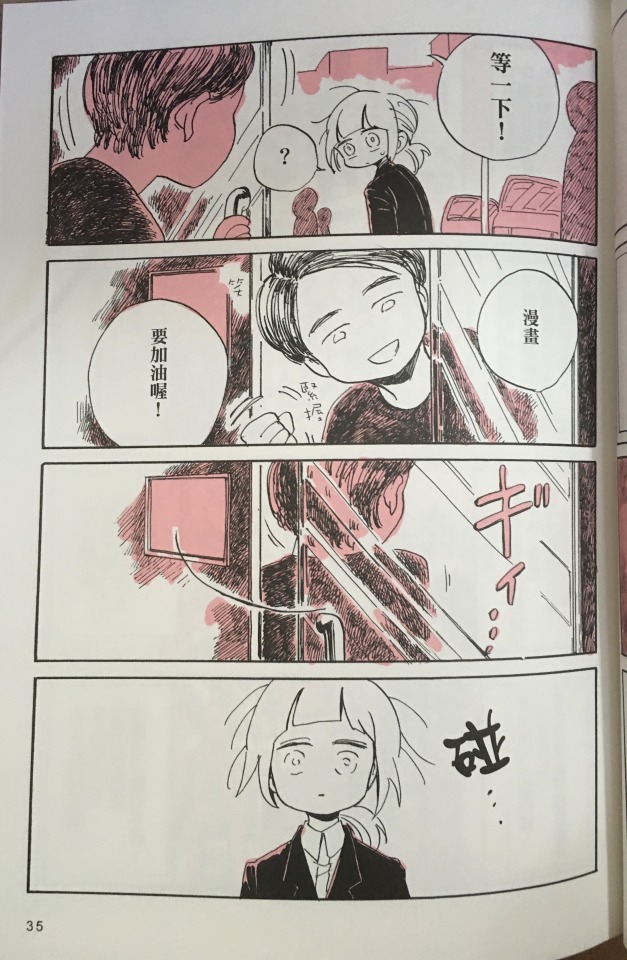
After going through quite a few job applications, one of the interviewers tells her "Ganbatte!" (You can do it!) after Nagata tells her what she really wants is to be a manga artist.
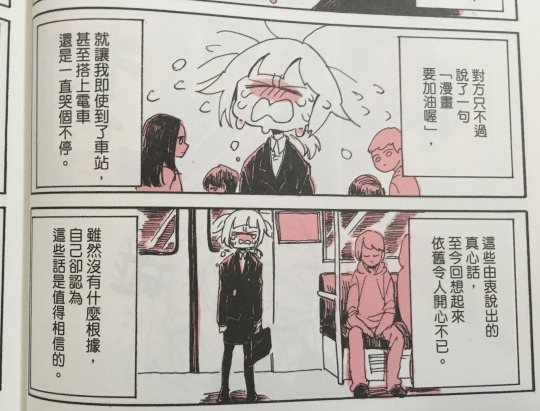
And sometimes that's all we need really, a small gesture or kind remark can do wonders. Even if there's no base or reason for it, it's something worth believing in.
I often have doubts if I'm doing what I really want, if I chose the right major for college, if I'm doing the right thing, if I'm 'good enough'. I didn't grow up with much self-esteem as a kid, and often derived my value from others. But even at my lowest times, a 'you're doing ok' was very reassuring to me, be it from family, strangers, or people I care about. Sometimes that's exactly what we need, it may be small but it could be the difference between continuing to wallow in depression or re-evaluating and choosing to be better to oneself.
I find it's really important to know, that however alone you may feel sometimes, there are other people out there going through the exact same thing. It's something universal, and while a lot of things are really unfair in life, each person has their own lot or burden to deal with. I have a Taiwanese friend who, while being more financially well-off than me, has terrible parents. And I mean parents who are quite so literally toxic, unsupportive of her, and would outright say the worst things to their own daughter.
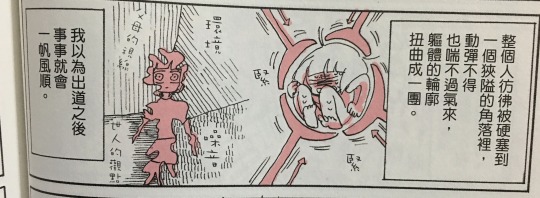
How depression and anxiety can feel sometimes, we can literally feel like it's impossible to breathe and be in a state of disconnection from the world.
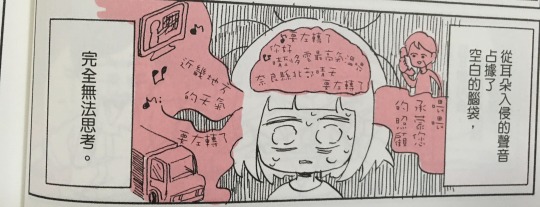
"The sounds that invaded my ears occupied my empty brain, making me unable to think at all."
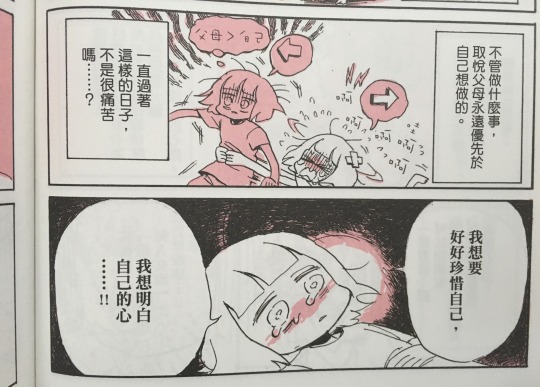
If you only did what your parents asked you to do, wouldn't days like those be very painful? In the end, only you can understand what you really want.
Nagata's art style is one I would describe as simple, cute, and effective. I personally think had her story been drawn in a more serious style, it would have been even harder to read, much less finish. It's also a choice that has artistic appeal to me, serious subject matter juxtaposed with a 'kawaii' art style.
Nagata also depicts very well her mental state and thoughts throughout her struggle and journey to self-actualization. Depression is a really tough thing to deal with, and sometimes we don't even realize that we have it or if we do, refuse to acknowledge it. In Asian cultures especially, mental health has always been something of a taboo subject and there is a very heavy social stigma associated with it. Nagata herself even said that her parents seemingly refused to acknowledge that their daughter's mental health was in a state of distress. In Japan, there is a concept called gaman (我慢), which is described as 'enduring the seemingly unbearable with patience and dignity', and while it is portrayed as an ideal virtue that inspires perseverance, it can be a source of heavy pressure for others. Gaman also means that you are expected to suppress whatever emotion or negative feelings you have, often for the sake of others and no matter how tough the situation becomes for you. And while I agree that through gaman you can become more selfless for others, it shouldn't have to come at the expense of your own well-being.
I was quite fortunate to have grown up in a more liberal Asian household, but even when it came to mental health, our family also adopted the same kind of attitude towards it, by carrying on as if nothing was wrong, or just not talking about it. And to be honest, there were numerous times I wished we had been more open about what was bothering ourselves at that time. Talking and being open about your feelings is not a 'weakness' but something incredibly brave to do, and it's my wish for that to slowly become more acceptable in Asian cultures, which I know is kind of a stretch, but it doesn't hurt to hope.
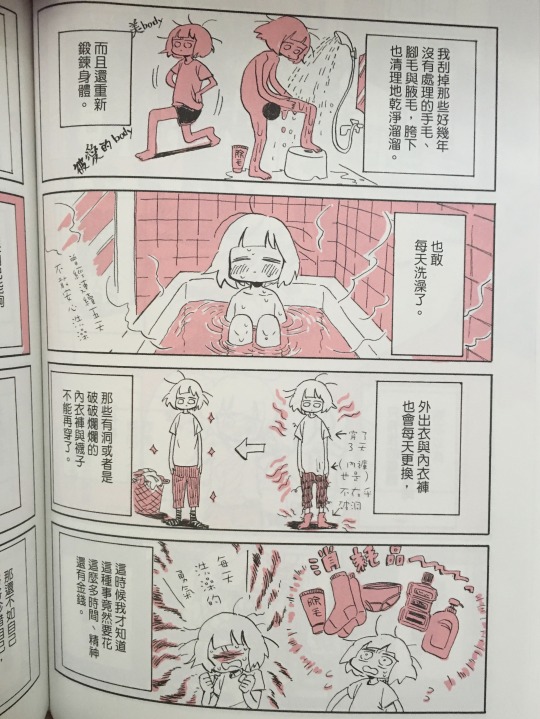
Nagata makes the decision to clean herself up, by taking a bath everyday, habitually exercising, and no longer wearing worn-out clothes.
Depression especially can be a bitch. It deprives you even of your physiological needs, like your need for food. Nagata had to struggle with that on top of eating disorders for a long ten years. She ate so little and even felt that she didn't 'deserve' to eat, and at one point, anorexia became hyperphagia, and she would feel so guilty for eating almost expired/expired food. Things that would otherwise be simple to do also end up becoming difficult/impossible to do, like taking care of your personal hygiene, getting up from bed, doing simple tasks etc.
Thankfully, after Nagata realizes that she never truly 'valued herself', she starts to turn over a new leaf. Even just starting with cleaning herself up, she takes this as a form of 'valuing oneself' and her mood starts to improve, which her family also points out. In the end, taking care of yourself is not a selfish thing to do, it can even make you a better person who is there for others.
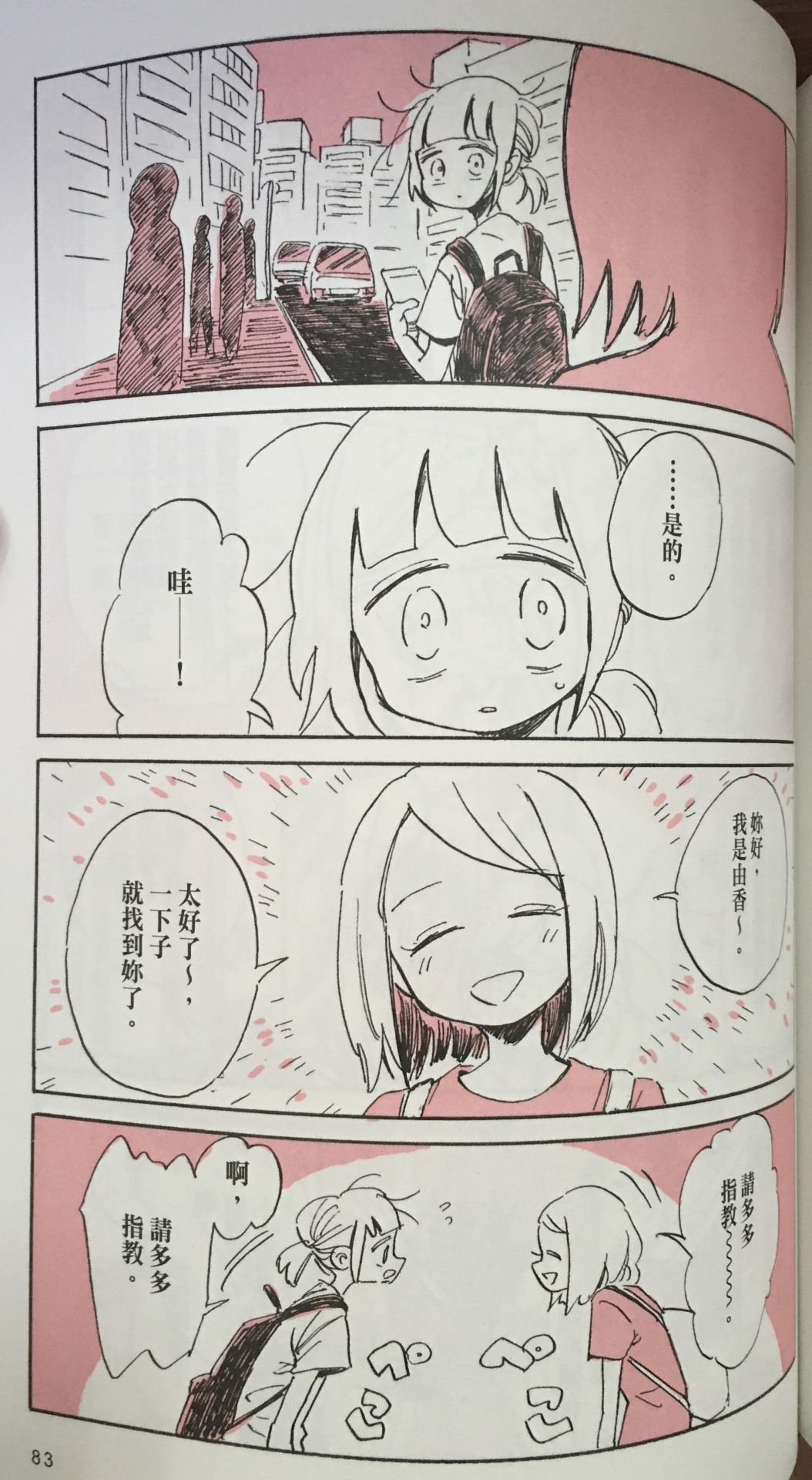
Nagata meets up with the female escort she hired, as a means to experience human sexuality, which she had always repressed her curiosity for and treated as a taboo subject. (NOTE: And I'm glad that she met a really nice girl for her first time too!)
Sex and sexuality is also a subject that I feel is hard to talk about sometimes, which I think also owes itself to most Asian cultures being relatively conservative about it. I myself have only recently identified as bisexual, which I attribute to internalized homophobia, not wanting to admit I was into girls too. And to be honest, 'coming out' is something I'm still uncomfortable about, because I don't want to risk my relationship with my family and it's still something I would choose to be selective about with colleagues and friends. I'm grateful though that as crazy the Internet can be sometimes, it can be quite accepting and tolerant towards things that we wouldn't otherwise discuss with even the closest people in our circle. Nagata's memoir ended up capturing the hearts of many readers ever since she first published it on Pixiv.
Exploring your sexuality doesn't have to be scary, it should be something exciting and liberating. Nagata decided to take matters into her own hands, and while the days leading up to the encounter made her really nervous and she even considered not going through with it at all, she willed herself to continue, because she wanted to do this for herself, it would be pointless if she gave up after coming so far in her decision to value herself.
And it's these series of actions that she decided to do that ultimately led to her life turning out for the better, it gave her the courage to do what she always wanted: to be a manga artist, which lead to the publishing of this autobiographical memoir, something she wanted to create that would 'make people want to buy this book' and from her own preference for reading stories that 'speak of secrets people wouldn't want to tell others'.
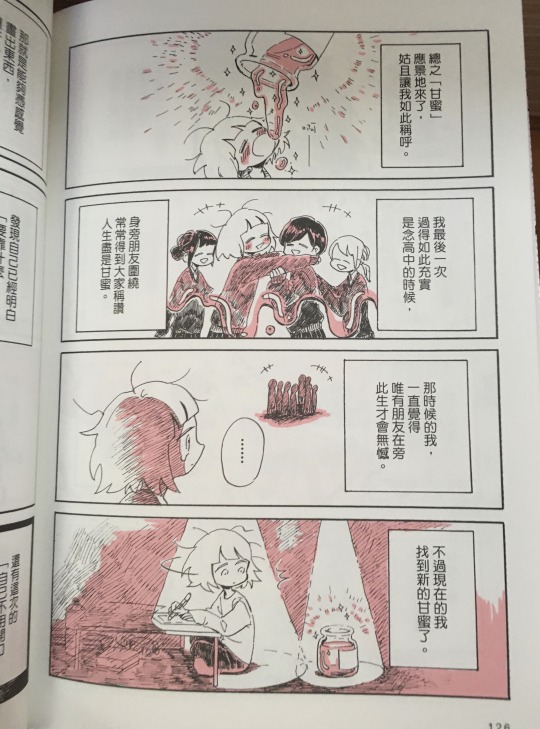
Nagata mentions what she calls 'honey': something that varies from person to person. It could be your reason for living, that thing that drives/pushes you, or even your sense of belonging. It may not be something permanent, but you can always find yourself a new one. (she mentions the last time she had her 'honey' was during her high school days, and while she has grown apart from the friends she made, she has found her new 'honey' in the form of being a full-time manga artist.)
Nagata stumbles and trips a lot on her way to being a better version of herself, but who doesn't? She admits to things not necessarily being smooth, but at least she's doing better than before. And it's that decision to at least try that counts. We don't have to be perfect, we're all human after all.
TL;DR My Lesbian Experience With Loneliness is a honest, down-to-earth, and ultimately hopeful memoir about the struggles of mental health and learning about one's sexuality. It's an amazing book, and very much worth the buy.
A big thank you if you read through all of this too. I know it's a mess and writing isn't exactly my strong point, but hopefully I've convinced some people out there to give this book a read! Please feel free to share your thoughts and I'd appreciate it very much too if you reblog/like this post.
#my lesbian experience with loneliness#the private report on my lesbian experience with loneliness#nagata kabi#kabi nagata#yuri#girls love#gl#lgbtq#lgbtq+#lesbian#lesbians#comic#comics#comic books#books#book review#graphic novel#web comic#pixiv#mental health#tw depression#tw suicidal thoughts#tw eating disorder#tw self harm#personal stuff#taiwan#philippines#japan#asian#I wrote something xD
21 notes
·
View notes